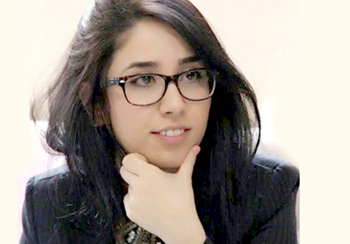Jeddah, Sep 29: A leading Turkish political analyst has described Crown Prince Mohammed bin Naif’s visit to Ankara as “highly significant and extremely timely.”
 Speaking to Arab News from the Turkish capital, Sinem Cengiz, a Kuwaiti-born Turkish national specializing in Turkey’s relations with the Middle East and is currently press adviser at a diplomatic mission in Ankara, said the significance of the visit can be gauged from the fact that it is coming against the backdrop of a failed coup attempt by a small junta embedded in the Turkish Armed Forces against the Turkish government.
Speaking to Arab News from the Turkish capital, Sinem Cengiz, a Kuwaiti-born Turkish national specializing in Turkey’s relations with the Middle East and is currently press adviser at a diplomatic mission in Ankara, said the significance of the visit can be gauged from the fact that it is coming against the backdrop of a failed coup attempt by a small junta embedded in the Turkish Armed Forces against the Turkish government.
“This visit is being seen in Turkey by the government and the Turkish people as Saudi Arabia’s big endorsement of Ankara at a critical time,” she said.
“There is no doubt of the significance of the Saudi delegation’s visit to Turkey under Crown Prince Mohammed bin Naif,” she said. “The visit sends multiple messages. When Turkey experienced a bloody coup attempt on July 15, Saudi Arabia stood by the government and the people of Turkey. This was widely praised,” she said.
According to Cengiz, Saudi-Turkish strategic cooperation in all fields is very crucial to both sides. “Saudi Arabia and Turkey are two important countries in the Middle East. They are two crucial heavyweights. The cooperation between them is not limited to bilateral or economic ties, but includes cooperation in the fight against terrorism, especially in the Syrian context. This has been the case for the last five years.”
She said both countries were acutely aware that Turkey needed Saudi Arabia and that Saudi Arabia needed Turkey “to promote regional stability which is very important to both sides.”
She said the timing of the crown prince’s visit was very important. She pointed out that Moody’s, the credit ratings agency, had downgraded Turkey’s sovereign credit rating, but Gulf businesses had nonetheless continued to invest in Turkey.
“The message that Saudi Arabia is sending with this visit is that it has full faith in the Turkish economy regardless of the negative ratings. I am sure more investment opportunities will be discussed during the visit which could take Saudi-Turkish business ties to a new level,” she said.
Cengiz said there had been reports in the Turkish media about the signing of a Free Trade Agreement between Turkey and the Gulf Cooperation Council (GCC) countries.
“This will also be discussed during the meeting,” she said. “And taking into consideration, the advancing economic ties, I think the signing of such an agreement will be a milestone in the two countries’ relations.”
According to her, Saudi Arabia and Turkey are on the same page on Syria. “There may be some small points of divergence here and there on some aspects of how to deal with Syria without Assad, but both countries have similar views on Syria,” she said. “They have been cooperating on Syria because that is in the interest of both sides. A stable Syria is very important for both countries.”
Also, Cengiz said, Iran’s influence on Syria was a concern for both countries. “Iranian expansion is considered a threat by both sides,” she said. “Therefore, this is another key issue for the two countries to cooperate on.”
She said Turkey still believed that Assad should not play a part in Syria’s future. “So there is no change in Turkish foreign policy,” she said. “But, of course, after the failed coup attempt, Turkey is going through an important transition in many areas, particularly its foreign policy.”
The Turkish operation against terrorists inside Syria that took place a month ago, she said, should be looked at in the context of Turkey’s current rapprochement with Russia.
“The recent military operations in Syria after the rapprochement are a very important step,” she said.
Cengiz said there was little interest in Turkey about the Middle East and Gulf states before Erdogan’s AK Party came to power. “We only started hearing and talking about Saudi Arabia and the Gulf states in the last decade. This has been reflected in our media as well,” she said.
She said there was great attention in the Turkish media to the crown prince’s visit. “In general, Turkish media is keenly following the visit,” she said.
According to her, the recent visit of Foreign Minister Adel Al-Jubeir created a very favorable environment. “He delivered a keynote address at a very important think-tank (SETA) on Sept. 9 on Saudi-Turkish relations. He explained in detail the need for a cooperative approach in a region that is increasingly being transformed.”
She said the Saudi minister delivered a “wonderful speech and took questions from the media. He was very articulate; I attended it and saw huge interest by the media in his speech and in his visit. All that was very positive for the relationship,” she said.
“We don’t see negative news about Saudi Arabia in the Turkish media, precisely because of the excellent relations that exist between the two countries.”
Cengiz said there were reports about a Turkish delegation visiting the Kingdom in October. “These high-level visits are significant; their timings are significant,” she said. “These are indications of the further strengthening of ties between the two countries.”





Comments
Add new comment